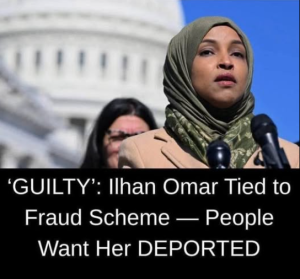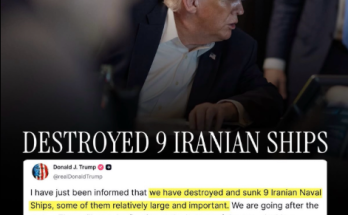
A former political associate of Representative Ilhan Omar has admitted guilt in a sweeping federal fraud case that siphoned nearly three million dollars from child nutrition programs meant to feed vulnerable children. On August 12, 2025, Guhaad Hashi Said, age forty-nine, appeared in a federal courtroom and entered a guilty plea to charges of conspiracy to commit wire fraud and conspiracy to commit money laundering. The plea makes him the fifty-second defendant to admit involvement in the wide-ranging “Feeding Our Future” scandal, one of the largest pandemic-era fraud investigations in the United States.
According to court documents, Said incorporated a nonprofit called Advance Youth Athletic Development in February 2021. On paper, the group was designed to provide services and food to children in need. In practice, the organization was a vehicle to extract federal reimbursements under the Child Nutrition Program. Prosecutors revealed that from March 2021 through early 2022, the nonprofit submitted daily claims for more than five thousand meals supposedly served to children in Minneapolis. These claims were falsified, padded, and in many cases completely fabricated. By the end of the scheme, Said’s organization had claimed over one million meals that were never actually distributed.
To support the false claims, Said and his accomplices produced forged attendance lists, invoices, and paperwork designed to deceive auditors. He also directed more than two million dollars from the nonprofit’s bank account to a catering business, presenting the transfers as payments for food purchases. Investigators later determined that this was a laundering tactic, shuffling funds among controlled entities to disguise their origins. Other portions of the money were used for personal enrichment, including real estate purchases, vehicles, and luxury items. The total loss attributed to Said’s role alone was calculated at just under 2.9 million dollars.
Federal prosecutors stressed that the crime was not an isolated act. Said’s plea is part of a broader pattern uncovered in the Feeding Our Future investigation, which has already led to dozens of guilty pleas. In September 2022, authorities charged forty-seven individuals for participating in coordinated frauds that together may have stolen as much as 250 million dollars from government nutrition programs. Over time, the case has grown, with new indictments and pleas bringing the total number of defendants to more than fifty. Said’s admission of guilt is another major development in a scandal that has shaken Minnesota’s nonprofit sector and raised questions about government oversight.
The potential penalties facing Said are severe. Each conspiracy count carries a maximum of twenty years in prison, and sentencing guidelines will weigh the scale of the fraud, the laundering activities, and any cooperation he provides to investigators. Although sentencing has not yet been scheduled, prosecutors have indicated that they will pursue restitution, meaning Said could also be required to repay millions of dollars in misused funds.
Political reverberations have followed the case because of Said’s previous ties to Representative Ilhan Omar. Reports note that he once served as an associate in her campaign circles. While no evidence links Omar to the fraud, the association has fueled criticism from her opponents and placed her under renewed scrutiny. Supporters argue that the connection is unfair and that she cannot be held responsible for the independent criminal actions of a former aide. Still, the political fallout illustrates how financial crimes can have consequences that ripple into public trust and reputations.
The Feeding Our Future scandal highlights systemic vulnerabilities in how federal programs disburse money through nonprofit intermediaries. The Child Nutrition Program was designed to reimburse organizations that provided meals to low-income children. During the pandemic, the program expanded rapidly to meet heightened need. In that environment, oversight weakened, and fraudulent operators took advantage. With relatively little auditing at the time of reimbursement, organizations could exaggerate or fabricate meal numbers and receive millions before red flags were raised. By the time investigations caught up, much of the money had already been spent or hidden.
Federal officials describe the scandal as a warning. It shows that even well-intentioned programs can be undermined when safeguards are insufficient. Going forward, agencies are expected to tighten auditing requirements, vet nonprofit sponsors more carefully, and demand clearer documentation. At the same time, the case underscores how criminals adapt quickly to exploit crises like the pandemic. The scale of the fraud—hundreds of millions across all defendants—ranks among the largest pandemic-related scams prosecuted so far.
For communities in Minnesota, the betrayal has been particularly painful. The Feeding Our Future program claimed to serve immigrant and low-income neighborhoods where food insecurity is a daily reality. Instead of providing nutrition, some operators enriched themselves while children were left without promised support. Local leaders and parents have voiced anger, describing the fraud as theft not just of dollars but of trust.
As for Said, his guilty plea closes one chapter but signals the start of another: sentencing and potential cooperation with prosecutors. His testimony could strengthen the government’s cases against others still awaiting trial. It may also shed light on how fraud networks were organized, who benefited most, and how oversight failed.
In the coming months, the federal court in Minnesota will determine Said’s punishment. Whatever sentence he receives, his story will remain part of a much larger cautionary tale about how greed can distort public programs, how oversight lapses can be exploited, and how even political associations can complicate public perception. The Feeding Our Future scandal has already reshaped debates about accountability in nonprofit partnerships and has become a national symbol of pandemic-era fraud. Guhaad Hashi Said’s downfall is just one piece of that larger puzzle, but his guilty plea adds weight to the government’s effort to show that those who exploited the system will ultimately be held accountable.

